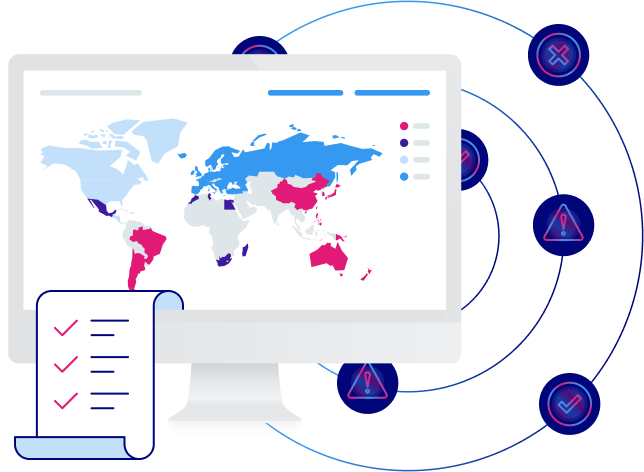-
Solutions
- AI Governance
- Responsible AI
- Geo-Specific Cookie Banner
- Consumer Preference Management
- Data Subject Request Automation
- Data Mapping and Vendor Risk Management
- Migrate
- Privacy, Vendor, and Risk Assessments
- Privacy Program Management
- Regulatory Guidance
- Privacy Program Consulting
- Certifications and Verifications
- International Data Transfers
Forrester TEI ROI of Privacy ReportTrustArc commissioned a Forrester study to analyze the potential benefits of using our platform and the Forrester team found ROI linked to efficiency, compliance, and decreased cost in data breaches.
Read the report -
Products Products Privacy Studio Overview
Automate consent and data subject rights compliance. Design seamless privacy experiences to enhance customer trust across your digital landscape.
- Cookie Consent Manager Effortlessly manage cookie consent for global compliance, ensuring a secure, personalized browsing experience.
- Consent & Preference Manager Easily manage and orchestrate customer consent and preferences across brands and channels.
- Individual Rights Manager Automate and streamline DSR workflows to ensure compliance and show your commitment to customer rights.
- Trust Center Centralize policies, disclosures, and trust-building information in a customizable no-code hub that speeds up deals.
Products Governance Suite OverviewStay ahead of privacy and compliance regulations. Simplify data privacy management and ensure data governance with cutting-edge apps.
- PrivacyCentral Centralize privacy tasks, automate your program, and seamlessly align with laws and regulations.
- Data Mapping & Risk Manager Gain full visibility and control of your data and accurately identify and mitigate risks.
- Assessment Manager Automate and score privacy assessments like PIAs and AI Risk, streamlining your compliance workflow.
- Nymity Research Get instant access to the latest in privacy regulations, legal summaries, and operational templates.
Products Assurance Services OverviewGain trust and credibility with leading privacy certifications from unbiased experts, backed by technology for unmatched privacy compliance assurance.
- Dispute Resolution
- TRUSTe Global CBPR and PRP Certification
- Data Privacy Framework Verification
- TRUSTe APEC CBPR and PRP Certification
- TRUSTe Responsible AI Certification
- TRUSTe Enterprise Privacy Certification
- CCPA/CPRA Validation
- GDPR Validation
- TRUSTe Data Collection Certification
- TRUSTe EDAA Privacy Certification
- Digital Advertising Alliance Validation
-
Regulations
- EU General Data Protection Regulation (GDPR)
- California Consumer Privacy Act (CCPA)
- Virginia Consumer Data Protection Act (CDPA)
- NIST AI Framework
- ISO/IEC 27001
EU Artificial Intelligence Act (EU AI Act)EU's regulation on the use of AI and the world's first comprehensive AI law.
Learn moreIndia Digital Personal Data Protection ActComprehensive data protection law governing the processing of personal data of Indian citizens.
Learn more - Resources
- Arc ✦
- Contact us
Personal Information Protection Law (PIPL)
China’s PIPL applies to personal data processed within the People’s Republic of China.
Are you subject to the PIPL?
The PIPL applies to businesses conducting cross-border transfers processing activities outside the borders of China and Macau.
Key obligations under the PIPL
Maintain a data inventory
PIPL requires organizations to maintain records of processing activities, including the classification of data into general, important, and core categories.
Breach response responsibilities
The PIPL outlines remedial measures and notification procedures (immediate requirement v. 72 hours under EU GDPR) in the case of leakage, falsification, or loss of personal information.
Consent and privacy notice requirements
Under the PIPL, individuals must provide informed consent for their personal information to be collected, used, or disclosed by organizations. This means that organizations must clearly explain their data collection practices and obtain explicit consent from individuals before processing their personal information.
Large-scale data processing and data localization requirements
The PIPL also includes data localization requirements for those entities considered to conduct a significant volume of personal information processing (critical information infrastructure operator (CIIO)) meaning that personal information collected in China must be stored on servers located within Chinese territory.
Cross-border data transfers (CBDT)*
If not classified as a CIIO entity, and an entity wants to transmit or share personal information outside China, it must fulfill at least one of the following conditions:
- Complete a security review subject to review by CAC
- Complete PIPL’s standard contractual clauses (SCCs)
- Complete certification requirements through an independent provider selected by CAC
*This area of PIPL continues to be evolving and subject to change, including several draft PIPL “Draft Measures” under review by the Cybersecurity Administration of China (CAC).
Organizational management
If classified as a critical information infrastructure operator (CIIO), those organizations must appoint a personal information protection officer (DPO) to oversee obligations. All others, it is highly recommended to have a privacy lead to oversee the processing of personal information and implement plans for cross-border processing activities in accordance with PIPL.
Conduct impact assessments and security audits
Processors must adhere to the regulations outlined in the PIPL and conduct a personal information protection impact assessment (PIPIA) prior to the transfer (transfer of sensitive personal information (SPI) for human resource purposes. This includes identifying the types of personal information being processed, assessing the risks to individuals’ rights and freedoms, and implementing measures to protect this data. Conducting impact assessments and regular security audits is recommended.

China’s Personal Information Protection Law (PIPL)
PIPL, a major privacy law in China, impacts global businesses and now protects 1.5 billion people — roughly 20% of the world’s population. Learn about the requirements of PIPL and how your organization can comply.
Achieve PIPL compliance with TrustArc
-
Privacy program development and compliance management Identify gaps and track compliance. PrivacyCentral assesses China’s PIPL, Cyber Security Law (CSL) and Data Security Law (DSL) regulation specifics and automatically provides guidance on building out a sustainable privacy program.
-
Complete and maintain a data inventory Automate with TrustArc’s Data Inventory Hub. Save time and reduce risk with automated data flow mapping, risk analysis, and remediation for personal data processes and general activities associated.
-
Mitigate risks Use pre-built personal information protection impact assessment (PIPIA) and automatically produce a mitigation plan using TrustArc’s Assessment Manager.
-
Record consent Easily honor customer privacy preferences at every touchpoint with TrustArc’s Consent and Preference Manager across all your applications, domains, mobile apps, and connected TV.

PIPL FAQ
- When did the PIPL take effect?
- Does all Chinese personal data need to stay inside China’s territory (data localization)?
- When did the PIPL SCCs take effect?
- Does the PIPL apply to the Personal Information of deceased individuals?
- Is Sensitive Personal Information (SPI) treated differently from Personal Information (PI)?
- What is the age of consent under PIPL?
The information provided does not, and is not intended to, constitute legal advice. Instead, all information, content, and materials presented are for general informational purposes only.




